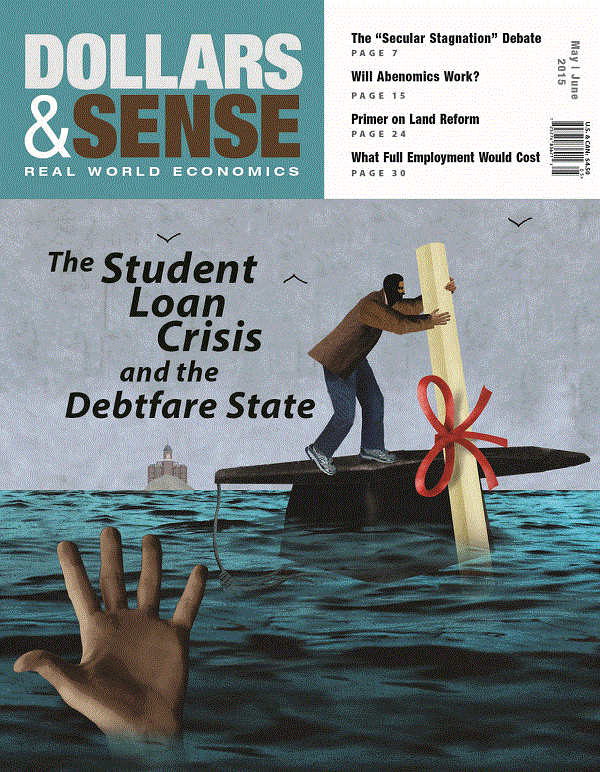Fighting Climate Change in Portlandia
Not only is failure not an option, those fighting to avert cataclysmic climate change have achieved important successes worthy of celebrating.

New issue! Our May/June 2015 issue is out (for electronic subscribers; print subscribers will get their copies in about ten days). We have posted one article from the issue, Marie Duggan's timely piece A Way Out for Greece and Europe: Keynes' Advice from the 1940s. Our page-two editorial note (written this time by my co-editor, Alejandro Reuss) is an unusually good guide to the issue this time, stitching together most of the articles in the issue under the (unplanned) theme of "Reform and Revolution":
For mainstream liberalism, it is an article of faith that our social ills can be fixed by this or that relatively modest government intervention. There’s certainly some truth to the view that economic outcomes—especially those of so-called “free markets”—can be improved upon by well-designed public policy. Even an honest neoclassical economist should recognize many instances of “market failure,” and so the need (at least sometimes) for government intervention. But political institutions in capitalist societies are not generally arranged so as to generate the right interventions—even “sensible” public policies that would seem to benefit virtually everyone, to say nothing of those that would benefit the majority at the expense of powerful elites.
In the exercise of government power, elites often hold the trump cards. The policies adopted often exacerbate social problems, rather than reducing them. Thinking of social problems as basically caused by the misdeeds of private actors coupled with the inaction of government, then, is not generally correct.
Susanne Soederberg gives a shining example in her cover story “The Student Loan Crisis and the Debtfare State.” Soederberg argues that the “consumer protection” framing of the problem—that the solution is to get government involved to rein in the predatory practices of private educational lenders—is fundamentally flawed. The “debtfare state,” in her view, has actively facilitated such practices. Government policy has pushed higher education into debt-based financing, and the state has acted as the enforcer of student debt obligations.
Christopher J. Cooper’s “Active Culture” article, “The Crisis at Corinthian,” provides a stark illustration—exposing not only the predatory practices a for-profit college educational chain, but also the Department of Education’s harsh insistence on full debt repayment.
Junji Tokunaga’s article on the economic policies of Japan’s Prime Minister Shinzo Abe, too, illustrates this point. There has been no lack of intervention by the Japanese government to address the country’s decades-long economic stagnation. However, policies that make perfect sense from a mainstream Keynesian standpoint—expansionary monetary and fiscal policies—have gone along with others that both favor elites at the expense of the majority and are likely to impede the country’s economic recovery—like tax cuts for corporations coupled with tax hikes on ordinary people.
In her piece on the current economic crisis in Europe, Marie Duggan points to a failure of political institutions to deal with trade and debt imbalances, except in ways that are extremely costly and painful for ordinary people. Europe’s main policy-making institutions have pushed—especially on Greece—austerity policies sure to inflict great suffering on the people and likely to undermine economic growth across Europe. Duggan points out that John Maynard Keynes developed a better solution way back in the 1940s: make surplus or creditor countries spend their surpluses (rather than hoarding them), which will boost demand for goods in the deficit countries, allowing the latter to grow their way out of debt.
Both John Miller’s “Up Against the Wall Street Journal” and Arthur MacEwan’s “Ask Dr. Dollar” point out that the burning problems in the U.S. economy—how to achieve sustainable growth and good jobs for all who want them—are not economic, but political. That is, we have the resources we need to solve our problems, but they are not deployed correctly because powerful interests stand in the way. MacEwan is quite right that life in capitalist America could be improved dramatically, even “without some drastic system change,” if only these barriers to reform could be overcome.
Jawied Nawabi’s “Primer” on land reform and its importance to economic development really gets to the root of the matter. Part of the case for land reform, he notes,
is economic—for example, small farms actually produce more output per acre than
large landholdings. However, the crux of the case is not narrowly economic, but “socio-political.” Land reform is so essential to economic development because the power of large landlords stands in the way of needed development policies.
In other words, you may aim at sensible, necessary reforms. But to get those reforms, you just may need a revolution.
Not a subscriber? Click here to sign up online--we can get you an electronic copy of the magazine pronto.